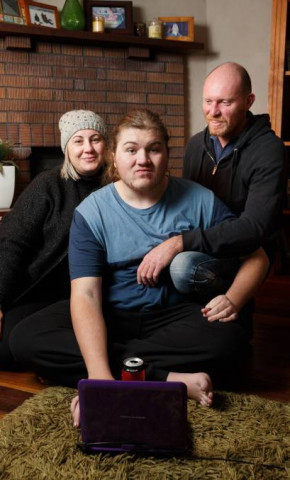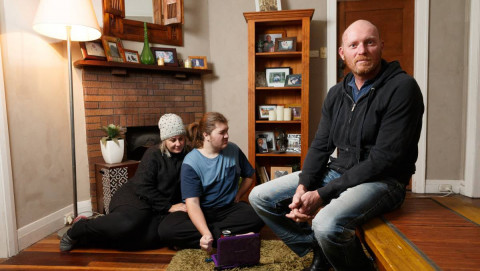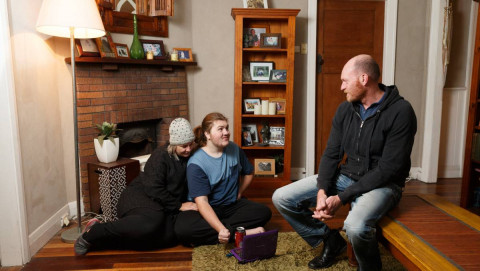


Anita Beaumont
IF Luke and Katrina Horn both worked nine-to-five jobs, they say there is “no way” they could cover the care of their 18-year-old son under his latest National Disability Insurance Scheme (NDIS) plan.
Dillon Horn, of Newcastle, has autism and epilepsy, and he is non-verbal.
Until now, Dillon has not needed “a lot” in terms of his NDIS plan because he was attending a special development school, full time.
But those circumstances have changed, and now his family is fighting a decision to slash Dillon’s funding by 21 per cent when he needs the support “more than ever.”
“We sat down with one of the NDIS planners at the end of last year to discuss what his needs were for his transition years coming out of school,” Mr Horn said.
“I also had a psychiatrist report and a psychologist report – we had everything that was required to show what Dillon needed moving forward, and why. But that was all ignored.”
Related reading: Inquiry into disability privatisation.
The Horns had hoped Dillon’s new plan would give him access to a carer who could take him out into the community a few times a week to participate in social activities and increase his independence.
When it arrived in January, rather than an increase in funding to meet Dillon’s new needs, the National Disability Insurance Agency (NDIA) reduced it from almost $41,000 to about $32,000.
The Horns said no explanation was provided, and their protests since had been ignored. There had been no responses to any of their formal complaints.
“Both myself and Dillon’s mother are registered nurses, and even though we don’t live together, we have been able to support him so far,” Mr Horn said. “She works the morning shifts, and I work the afternoon shifts so that we can look after him.
“But the new plan didn’t take into account any support for Dillon through business hours.
“When the new plan came out, there was no discussion whatsoever. It was, ‘This is your plan,’ and pretty much, ‘That’s it, bad luck.’
“If we didn’t have the privilege of being able to work shift work, we’d be in a huge amount of trouble.”
Related reading: Medowie family is fighting for funding.
An NDIA spokesperson defended the new plan, saying Dillon’s current funding was more than twice the amount he used from his previous plan.
“We didn’t use all of the funding last year because we didn’t need the extra care through the day while he was going to school. We need it now,” Mr Horn said.
“This is my point, they aren’t listening to us. He is an 18-year-old man who is pretty much forced to spend all of his time with his family.
“Yes he has autism, and he does have daily needs, but he is still a teenager.”
Mr Horn said Dillon’s care needed to be one-on-one, due to his propensity to become aggressive when distressed. But the current plan covered one carer to three people.
The Horns not only needed to know their son was safe while they were at work, but that the other people with him were too.
“He is about 130 kilos and when he gets upset, he does show signs of aggression towards other people too,” Mr Horn said. “We explained all of that to them.
“They said we could use the funding however we liked, so we could do one-to-one care, but the funding is going to get eaten up pretty bloody quickly.”
As it stands, the funding has almost run out, with no word from the NDIA regarding the outcome of the review Mr Horn requested six months ago.
“With this system, there doesn’t seem to be anybody responsible for what we need,” he said.
“You can spend hours on the phone, put in complaints, and nothing. How much time can we put into this and get nothing back?”
Ms Horn said she worried how Dillon would cope when they were no longer able to care for him.
“This isn’t about us, or about respite,” she said. “It’s about Dillon being able to get out there in the community and do the basic things.
“He has to, at some stage, get used to being with other people. At the moment he is only with us. We are getting older. How is he going to cope when we’re not here?”
Ms Horn said caring for someone with a disability full time could be challenging, and at times, overwhelming.
It can be a dark place for parents and loved ones, and when the support is taken from under you because of their lack of budgeting or organisation, it’s a hard pill to swallow, because we are already suffering, and we are already dealing with so much.
Katrina Horn
“It can be a dark place for parents and loved ones, and when the support is taken from under you because of their lack of budgeting or organisation, it’s a hard pill to swallow, because we are already suffering, and we are already dealing with so much,” she said.
Dillon had physically hurt her during meltdowns, and they were “constantly on tenterhooks,” because he also needed to be watched for signs of an impending seizure.
“His needs are complex,” she said. “Unless he’s asleep, we are always watching Dillon. It is like having a little child in that he can’t tell us how is he feeling.”
The Horns said if the NDIS was going to work, the planners needed to carefully consider the current and changing needs of each person, and listen to the carers who knew them best.
“The whole philosophy of the NDIS is about giving the power back to the decision-makers for the person with a disability. It’s about having choice, and it’s about making life better for everybody,” Mr Horn said. “Well, the NDIS isn’t doing that. You put in a request for a review to say, ‘This isn’t going to work,” and you are just shut down. There is no feedback.
“We just want to be heard.”